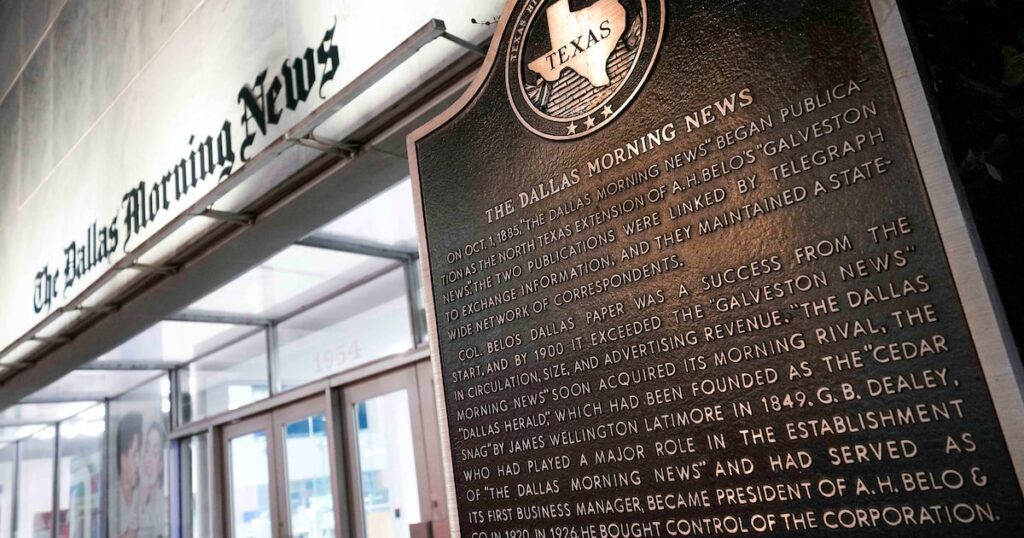
DMN
Classrooms have become the front lines of our culture wars, as debates over hot-button issues ripple through our schools.
The region’s public schools and universities opened a few weeks ago to a host of changes and tensions: a ban on diversity, equity and inclusion programs work in K-12 schools, free speech conflicts in higher education, and legal fights over displaying the Ten Commandments. And those are just a few.
The public pays close attention to those issues. And yet parents also want to know what their children are learning in school, and with the arrival of private school vouchers, they may also need help deciding where to send their kids in the first place.
This is the challenge faced by our community-funded Education Lab, The Dallas Morning News’ team of four reporters and an editor focused on education: How can they cover the culture war battles without ignoring key subjects such as school safety and classroom instruction?
North Texas is home to 8.3 million residents and scores of school districts, including Dallas ISD, the 16th largest in the country. That’s a lot of ground to cover.
To its credit, The News has made education reporting a priority. And over the past year, the Ed Lab has done some of the paper’s most noteworthy work. This includes a project about how more students face criminal charges for making threats, and a piece about a high school teacher’s struggle to regain her mental and emotional footing after being grazed by a bullet. Not to mention wall-to-wall coverage of education issues in this year’s Texas legislative sessions.
“Our education reporters are as much legislative reporters as anything else, especially when the Legislature is in session,” says Steve Bruss, Assistant Managing Editor for News, who oversees our local report. Some “spend as much time listening to legislative hearings as they do in the classroom.”
That makes sense. And yet, as Bruss himself notes, The News must balance its coverage.
With private school vouchers now a reality, for example, we can guide our audience through a thicket of questions and decisions. The News is uniquely positioned to provide smart, insightful, and practical reporting.
Accountability coverage should go with utility. Charters and private schools are run under their own rules, which makes it more important — albeit harder — to show readers how they are using public funds.
“Sometimes we default to doing what’s easiest — in covering just public schools — and we forget about how many children are educated in private schools or even at home,” Bruss says. “We have to fight a little bit of that inertia.”
He adds, referring to private schools and charters: “We have to write about them, and we have to hold them accountable.”
Bruss is eager for more classroom reporting in public schools, too. This won’t be easy. As he says, some principals and district administrators are loath to give journalists access to their campuses, worried about bad publicity or offending their bosses. And yet this is essential journalism.
Take the new ban on cellphones: “I get a very clear perspective on how that’s impacting the day from my 10th grader,” Bruss says, “but I suspect there are nuances to that view that would help me better understand how it’s working, or not working, in the schools. Those are the kinds of things we need to be able to help parents understand.”
A few weeks ago, The News announced another community-funded initiative, called The Future of North Texas. Education coverage is a pillar of the project, as we seek to answer this question: As the region speeds toward a population of 12 million by 2050, how are schools preparing students for the workforce?
Bruss says reporters will try to figure out what that means both for school systems that have seen enrollment declines in recent years (such as Dallas and Plano) as well as those with booming growth (Frisco, for example).
This is a lot to ask of our education team. The politics of education will likely grow only more complex and urgent, tugging reporters away from bread-and-butter campus issues. Maybe The News needs more funding for this work, or maybe it needs to move resources around the newsroom.
The News’ commitment to education deserves kudos, but it means we have made an important promise to readers. Now, we must find a way to keep it.
A note to readers: The column on Sunday, Oct. 12, will address your questions regarding the sale of the DallasNews Corporation to Hearst.

